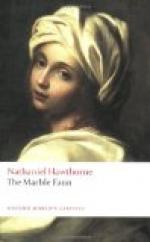Side by side with the massiveness of the Roman Past, all matters that we handle or dream of nowadays look evanescent and visionary alike.
It might be that the four persons whom we are seeking to introduce were conscious of this dreamy character of the present, as compared with the square blocks of granite wherewith the Romans built their lives. Perhaps it even contributed to the fanciful merriment which was just now their mood. When we find ourselves fading into shadows and unrealities, it seems hardly worth while to be sad, but rather to laugh as gayly as we may, and ask little reason wherefore.
Of these four friends of ours, three were artists, or connected with art; and, at this moment, they had been simultaneously struck by a resemblance between one of the antique statues, a well-known masterpiece of Grecian sculpture, and a young Italian, the fourth member of their party.
“You must needs confess, Kenyon,” said a dark-eyed young woman, whom her friends called Miriam, “that you never chiselled out of marble, nor wrought in clay, a more vivid likeness than this, cunning a bust-maker as you think yourself. The portraiture is perfect in character, sentiment, and feature. If it were a picture, the resemblance might be half illusive and imaginary; but here, in this Pentelic marble, it is a substantial fact, and may be tested by absolute touch and measurement. Our friend Donatello is the very Faun of Praxiteles. Is it not true, Hilda?”
“Not quite—almost—yes, I really think so,” replied Hilda, a slender, brown-haired, New England girl, whose perceptions of form and expression were wonderfully clear and delicate. “If there is any difference between the two faces, the reason may be, I suppose, that the Faun dwelt in woods and fields, and consorted with his like; whereas Donatello has known cities a little, and such people as ourselves. But the resemblance is very close, and very strange.”
“Not so strange,” whispered Miriam mischievously; “for no Faun in Arcadia was ever a greater simpleton than Donatello. He has hardly a man’s share of wit, small as that may be. It is a pity there are no longer any of this congenial race of rustic creatures for our friend to consort with!”
“Hush, naughty one!” returned Hilda. “You are very ungrateful, for you well know he has wit enough to worship you, at all events.”
“Then the greater fool he!” said Miriam so bitterly that Hilda’s quiet eyes were somewhat startled.
“Donatello, my dear friend,” said Kenyon, in Italian, “pray gratify us all by taking the exact attitude of this statue.”
The young man laughed, and threw himself into the position in which the statue has been standing for two or three thousand years. In truth, allowing for the difference of costume, and if a lion’s skin could have been substituted for his modern talma, and a rustic pipe for his stick, Donatello might have figured perfectly as the marble Faun, miraculously softened into flesh and blood.




